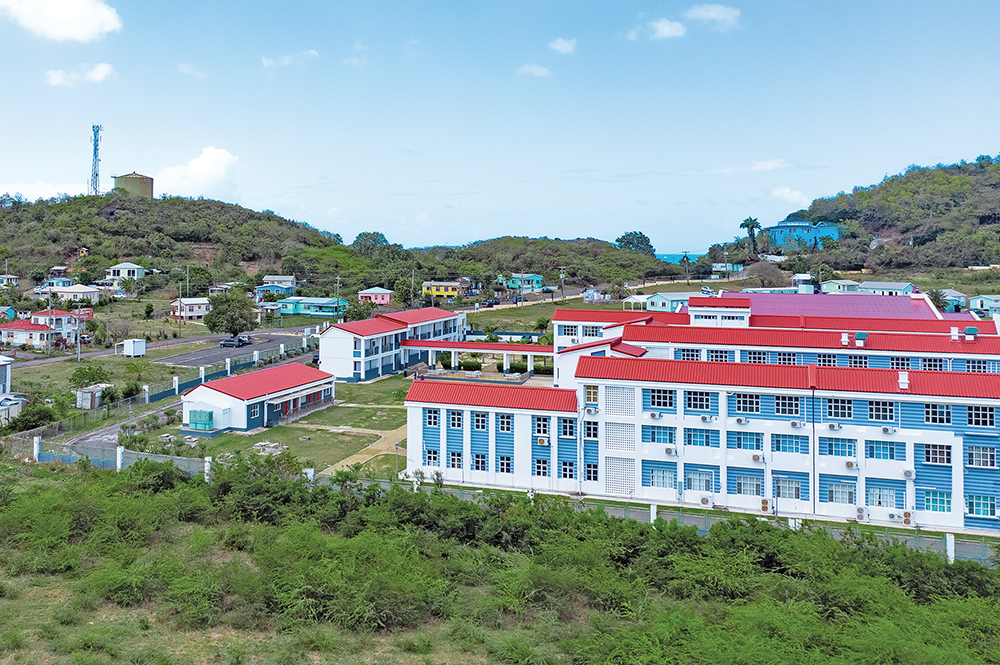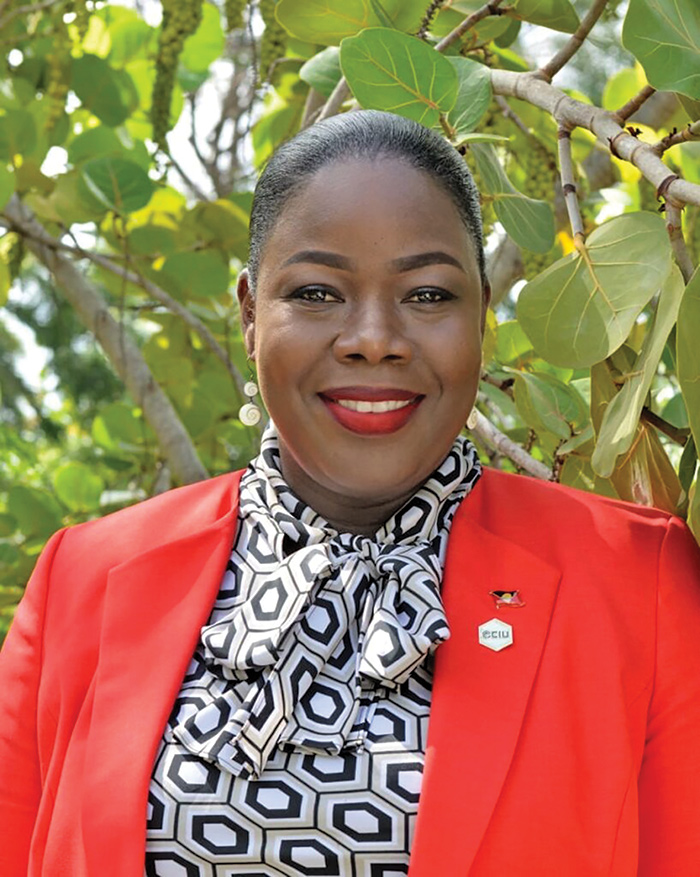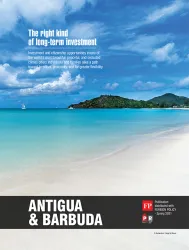Citizenship by Investment Unit CEO Explains the Perks of Antigua and Barbuda
Charmaine Quinland-Donovan explains the personal and professional benefits of taking up citizenship in paradise

Five Islands Campus University of the West Indies, a CIP Investment Option.
What are the benefits of your programme?
It is very important that readers understand that the benefits of programmes such as the Antigua and Barbuda Citizenship by Investment Programme are twofold. Yes, benefits accrue to the country in which investments are being made — though applicants also have a great deal to gain. Prior to joining this industry and working with the Citizenship by Investment Unit, I had not realised how great a social good these programmes were for many people. There are millions of people who, by virtue of where they are born, are restricted in many ways, including their ability to travel. Most require travel visas to a significant number of jurisdictions, which severely impedes their ability to conduct business. Many also have restrictions on the type of business they can engage in, which impacts wealth creation and their financial status. The advent of these programmes provides flexibility and enhanced lifestyle choices that inevitably lead to happier and fuller lives and freedom.

However, we go beyond simply issuing citizenship to individuals who may be in need of greater mobility. We also understand that we have an obligation to the wider community of nations. This is why we undertake this process with keen attention to whom we grant the privilege of citizenship to. We want to make sure that those who hold our citizenship are people of good repute. As a result, our due diligence process is very robust; we have several different tiers of due diligence and a number of compliance professionals working on our team to ensure we have a keen eye on the backgrounds and characteristics of the people applying to the programme. We are big on due diligence and transparency: we were the first programme to require that reports on the programme be made in parliament twice a year. Our Unit is committed to upholding international and ethical standards.
There are many places that offer this kind of programme. Yet you’ve been a pioneer in your set of offerings. Can you tell us about the fourth category that has been approved?
This is a very dynamic programme — it is constantly under review, and we are always looking at the industry and determining the needs of our clients. We ensure that we remain flexible enough to create options that could help more people, constantly looking at the needs of various people in different jurisdictions to see how best we can create products and services that are in line with what they need. We started with three options. Most countries would have offered the donation option — the National Development Fund — as well as the opportunity to purchase real estate; but we saw that there was an opportunity for us to attract people to develop businesses here as well. We want to diversify our economy, and we saw the CIP as a vehicle to facilitate this. We want people to focus more on agriculture and agro-processing. We also want to invite people who are experts in the technological field — our experience with the ongoing global pandemic crystalizes how important technology is and will be to the emergence and re-emergence of markets, which is why we continue to invite investors who wish to establish technology-based companies in our country. Opportunities also abound in Antigua and Barbuda for marine development, remote education, and manufacturing. The investment in business options allows for this type of economic diversification and expansion to take place. So far, most of the business investments have been focused on real estate — we have a number of hotels — but we are still encouraging people to utilise the other opportunities available.
Being the pioneers that we are, we wanted to bring the fourth campus of the University of the West Indies to Antigua and Barbuda. UWI is in the top 5% of the world’s universities. It was founded over 70 years ago, and I am proud to count myself an alum. Campuses exist in Barbados, Trinidad and Tobago, and Jamaica. Antigua and Barbuda was the first of the smaller islands to be able to host the campus. As one of the pull factors of the programme for families was its cost effectiveness; the government looked at our CIP offerings–we are one of the favourites for families of four and above — and created an attractive option for them. Most families have children or dependents of school or university age, so we wanted to create an option that helps include them, too. So if you apply under the University of the West Indies option, one of your dependents of university age will be able to attend the university, tuition free, for one year. The proceeds of this investment option will go towards expanding the university here in Antigua, as well as continually providing the financing it needs to be sustainable. We pride ourselves on being a responsive and responsible programme.
The Prime Minister said 366 applications were received in 2020, generating $115.7 million, a target set to double this year. What are your goals and expectations for 2021?
We intend to deliver on this mandate, but we know we have a reasonable government cognisant of the challenges being experienced worldwide. Several changes, including an expansion in the definition of ‘dependents,’ were made last year to support the programme’s growth. This means an applicant is now able to include unmarried siblings, grandchildren, and children up to the age of 30 in their application. This has been very welcomed by the industry, and we have been getting a lot of interest. That, plus the changes made to our processes internally, will help us to attract even more applications than last year. We are cautiously optimistic about the 100% increase; we recognise this mandate and are working hard to ensure that we can deliver it to the government.
Transparency is so important. How are you working with anti-money laundering and financial counter-terrorism professionals to protect the country’s image?Since the programme’s inception, our focus has been to ensure that successful applicants are individuals whom we would be proud to call citizens. Over time we have expanded and reinforced our vetting process. We have on board with us a number of due diligence agencies who provide background checks and similar services to Fortune 500 companies. They are very well-versed in confirming the identities of the persons who apply, looking into their background, and making sure that whatever information they submitted on their application is true and accurate, and that these persons are of good repute. We also have connections with intelligence agencies that provide us with information that is not necessarily widely available in the public domain. We utilise information we obtain through ‘open source’ checks, and compile all the information collected from the various sources previously mentioned in order to make an assessment of the application.As I said before, we have a number of certified anti-money laundering and financial counter-terrorism professionals on staff; I am one of them. Together we ensure that each applicant and their dependents are thoroughly vetted, so that by the
end of the process, we can be reasonably assured that the successful applicants have been deemed fit to receive citizenship.
Covid-19 has tested governments and communities around the world. What lessons are there to be learned?The key lesson that not only Antigua and Barbuda — but all governments — have learned is that there are always alternative ways to accomplish your goals. We have been accustomed to commuting to work every day, but now we know we can connect remotely to the network via a virtual private network to work from home and conduct virtual meetings. Our strategic planning enabled us to ensure that everyone had access to a device and stable internet connection so that when the country went into lockdown, we continued to serve our clientele. Indeed, the pandemic has taught us to be more creative and flexible in our broader thinking across many different contexts. I do not think that going forward we will be so close-minded as to think we need to simply stick to the status-quo because “That is the way we’ve always done things.” I also see that this pandemic has given young people a huge opportunity to launch themselves — especially since they tend to be savvier. I have seen a lot of innovative developments from young people here in Antigua in terms of advancing the quality and use of graphic design and designing payment
platform applications for bills and goods and services. What’s more, quite a few of them have also turned to farming.
We have also seen persons turning their hobbies into businesses. For example, I recently met a young lady who loved facials and massages but who, due to the lockdown, no longer could. So she decided to create her own related products for resale. What this pandemic teaches us is that we are all creative, if we just look inward and allow ourselves the capacity to create, explore, and evolve. What we will see post-pandemic is that we will no longer be focused on one way to complete a task or get things done; we will be a little more open-minded and innovative in our thinking.
How long does the online application take to complete?Our governing legislation mandates that we complete an application in 90 days. This year, we have been able to turn around applications in 8-10 weeks on average. We have taken the time to work on the process, get through the paperwork more quickly, and get the information we need to complete each applicant’s assessment. Of course, there are exceptions; in some instances, applicant information is missing, which can cause delays. Overall, though, we are very excited and optimistic about the state of our process right now.
What is your final message to potential applicants from the U.S.?
I would like to say that we really do welcome these applications and are heartened to receive them. Processing U.S. applications is generally seamless, which leads to a very efficient turnaround time, so we encourage submission of these. I wish to underscore that while we do not circumvent or shortcut any of our processes, since the information on U.S. citizens is so readily available, we are able to process their files in a very timely manner. As you might be aware, in the U.S. much of the information required is accessible electronically, which facilitates a more efficient assessment of the application. So I would like to invite all American citizens who desire to apply to the Antigua and Barbuda programme to do so. We have had a long history of diplomatic relations with our neighbor to the north, not to mention an equally long history welcoming tourists from the U.S. market, so we understand their culture and are very adaptable.
They would find it very rewarding to apply to our programme and interact with us, or if it caught their fancy, even move here or work remotely in this beautiful twin-island nation with its white and pink sand beaches and turquoise blue water. I do not want to sound cliché, but we really do live in a paradise, and I invite Americans to come and do the same. We will welcome you with both hands, readily, willingly and warmly.

 Download the PDF
Download the PDF